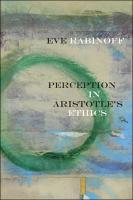Perception in Aristotle’s Ethics
Author(s)
Rabinoff, Eve
Collection
Knowledge Unlatched (KU)Number
101381Language
EnglishAbstract
Rabinoff strives to account for ethical perception (aisthesis) in Aristotle’s ethics—to give it a place of importance in ethical choice and action—and to offer an account of the faculty of perception expansive enough to include reception of the ethical significance of particulars. The book is motivated by particular features of Aristotle’s thought and by increasing philosophical awareness that the ethical agent is an embodied, situated individual, rather than a disembodied, abstract rational will. Traditionally, the soul has been understood to have a non-rational part characterized by desire and perception and a rational part characterized by thinking, knowledge, and argument. Depending on how the relationship between the sides is conceived, the non-rational is either a bane to be controlled by the rational, or plays an irreducible role in moral action. By establishing and accounting for perception’s place in ethics, Rabinoff shows the importance for ethical life of integrating both.


 Download
Download